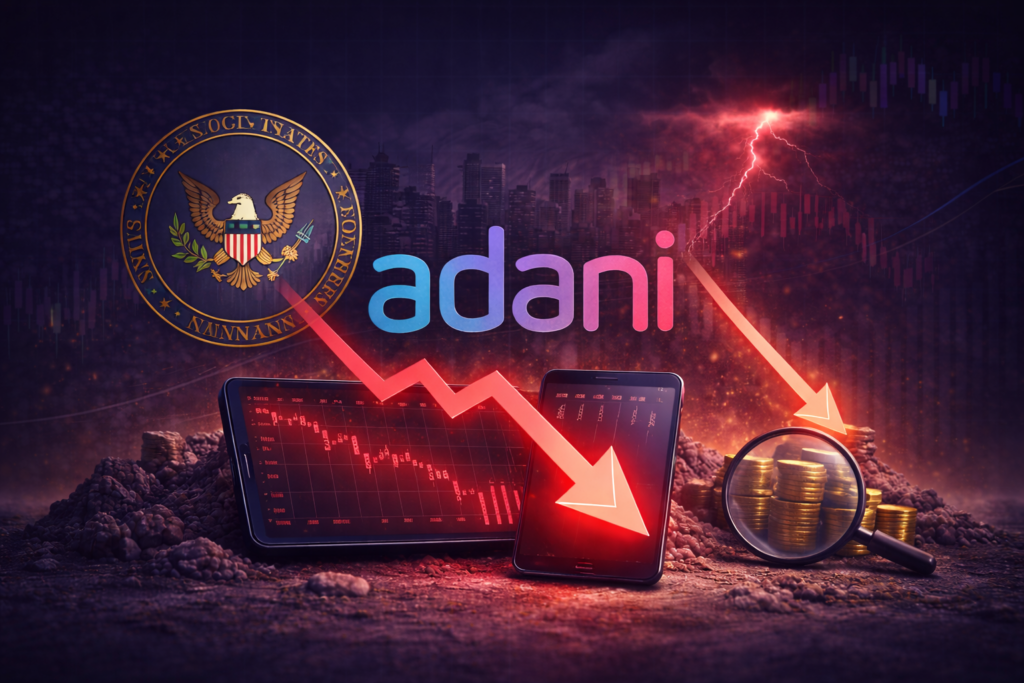The OTC market refers to a decentralised platform where financial instruments are traded between parties directly, without going through a formal stock exchange. In simple terms, the OTC meaning is trading that occurs outside regulated exchanges like NSE or BSE, typically through dealer networks.
Unlike centralised exchanges—where prices and trades are publicly recorded—OTC trading involves private negotiation between a buyer and a seller. This allows more flexibility in terms and instruments but often comes with higher risk and lower transparency.
In this blog, we’ll explain the OTC market’s meaning, how it works, who participates, what products are traded, and the key pros and cons, so you can understand whether it fits your investment or trading goals.
How Does OTC Trading Work?
Trading over the counter (OTC) operates differently from exchange-based trading. It involves transactions among buyers and sellers but without a centralised platform like the NSE or BSE.
Here’s how it works:
- No central exchange: OTC trades take place outside formal exchanges with prices and terms negotiated between parties directly.
- Dealers and market makers: These participants quote buy and sell prices, match trades, and may even hold inventory to provide liquidity in the OTC market.
- Execution channels: Transactions are carried out via phone, email, or through electronic dealer networks, depending on the product and market.
This decentralised structure makes trading over the counter more flexible but also less transparent and subject to greater counterparty risk. Investors commonly use it for customised contracts like OTC derivatives, unlisted stocks, and certain bonds.
Types of OTC Products Traded
The OTC market supports a wide range of financial instruments that are not traded on formal exchanges. While they often offer customisation and access to niche opportunities, they also come with higher risk and complexity. Here are the main types of products traded in an OTC market:
- Stocks: Includes unlisted shares and penny stocks that don’t meet exchange listing requirements. These are often traded by investors who are on the lookout for high-risk, high-reward opportunities.
- Bonds: Many corporate bonds and municipal bonds are traded over the counter, especially those with lower issuance volumes or customised terms.
- OTC Derivatives: This category includes forwards, swaps, and exotic options. These contracts are tailored between parties to manage risk, speculate on market movements, or hedge exposure.
- Commodities and Currencies: Spot and forward contracts in gold, oil, or foreign exchange as they offer flexibility in terms, delivery, and pricing.
OTC Market Participants
The OTC market primarily relies on a network of participants who play specific roles in facilitating trades. Here are some key entities involved in trading OTC:
- Dealers and Brokers: Dealers quote buy/sell prices and execute trades directly with clients. Whereas, brokers act as intermediaries between buyers and sellers.
- Institutional Investors: These include banks, mutual funds, hedge funds, and insurance companies. They are major participants in OTC derivatives and large-volume transactions due to their capacity to handle risk.
- Retail Investors: While participation is limited, retail investors may access OTC markets through brokers to trade certain stocks or bonds not listed on exchanges. However, risks are generally higher.
- Market Makers: These are firms or individuals who continuously quote both buy and sell prices in OTC securities, providing liquidity and helping maintain smoother price discovery in less liquid markets.
OTC vs Stock Exchanges: Key Differences
Both OTC markets and stock exchanges facilitate the purchase and sale of financial instruments but they operate very differently. Here’s how:
| Feature | OTC (Over-the-Counter) Market | Stock Exchanges |
| Structure | Decentralised, peer-to-peer network | Centralised, regulated platform |
| Transparency | Limited; prices are not publicly displayed | High, real-time price and volume data available |
| Regulation | Less regulated, varies by instrument | Strict regulatory oversight by SEBI or exchange authorities |
| Instruments Traded | Customised securities, OTC derivatives, small-cap stocks | Listed equities, ETFs, bonds, futures |
| Participants | Dealers, brokers, institutions, and some retail investors | Broad-based participation, including retail and institutional |
| Liquidity | Often lower, especially for niche products | Generally high for listed securities |
| Pricing Mechanism | Negotiated between parties | Market-driven with public order books |
Advantages of OTC Markets
OTC markets offer unique benefits that make them attractive for certain investors and companies, especially those that want flexibility beyond standardised exchange trading. These include:
- Flexibility in trading instruments: Trading over the counter allows for customised contracts, such as OTC derivatives, tailored to specific needs like hedging or structured exposure, unlike standardised exchange-traded products.
- Access to niche and exotic securities: Investors can trade a wider range of instruments (including lesser-known stocks, convertible bonds, or complex derivatives) which may not be listed on formal exchanges.
- Useful for smaller or emerging companies: The OTC market provides a platform for companies that don’t meet the listing requirements of major exchanges. This helps them raise capital and also get visibility among investors.
Disadvantages and Risks of OTC Trading
While trading OTC offers flexibility and access to customised instruments, it comes with several disadvantages that investors need to be aware of:
- Lower transparency: Unlike stock exchanges, OTC markets do not offer real-time price discovery or public order books, making it harder to assess fair value or market depth.
- Higher counterparty risk: In OTC trading, deals are made directly between parties. If one party fails to honour the agreement, there’s a risk of default, especially in OTC derivatives.
- Illiquidity and price volatility: Many OTC instruments are thinly traded, which means that it can be difficult to enter or exit a position without impacting the price, which might result in sharp price swings or delays in execution.
- Less regulatory oversight: OTC markets, generally, operate with fewer rules compared to formal exchanges. This means that there is an extra need for due diligence and understanding of contract terms.
Real-World Examples of the OTC Market
Here are some real-world examples of how the OTC market functions
1. Unlisted Indian Shares
Several companies in India, such as HDFC Securities or Reliance Retail, have unlisted shares that are bought and sold over the counter through broker networks. These transactions usually take place before an IPO or as part of private placements and require direct negotiation between buyers and sellers.
2. Use of OTC Derivatives by Large Institutions
Banks, hedge funds, and corporates regularly use OTC derivatives (currency swaps, interest rate swaps, or forward contracts) to hedge against market risks. For example, an Indian exporter may use a currency forward contract traded OTC to lock in exchange rates for future payments.
3. U.S. Examples
Smaller or foreign companies that don’t meet major exchange listing requirements often trade on platforms like Pink Sheets or OTCQX. These OTC networks provide investors access to capital markets with lower regulatory hurdles but carry higher risk due to limited disclosure.
Conclusion
OTC markets function through decentralised networks where financial instruments are traded directly between parties without a central exchange. This allows for greater flexibility and access to niche securities like unlisted stocks, corporate bonds, and customised OTC derivatives.
While trading over the counter can offer unique opportunities, it’s not suitable for everyone. The lack of transparency, higher counterparty risk, and limited liquidity make it more appropriate for experienced or institutional investors.
If you’re considering OTC products, it’s important that you do thorough research and understand the terms of each trade. Always exercise due diligence before investing in the OTC market.
FAQs
What is the meaning of OTC in finance?
In finance, OTC meaning refers to “Over-the-Counter” trading. It involves the direct exchange of financial instruments between two parties without any formal exchange. These transactions are typically negotiated privately.
How does the OTC market differ from stock exchanges?
OTC markets are decentralised and less transparent compared to stock exchanges. While exchanges have standardised rules and centralised platforms, trading over the counter happens through dealer networks, making it more flexible but also more opaque.
What are OTC derivatives, and how are they traded?
OTC derivatives are customised contracts (such as forwards, swaps, or options) traded directly between parties, not through exchanges. These instruments are tailored to specific risk or investment needs and are commonly used for hedging or speculation.
Is OTC trading legal and regulated in India?
Yes, trading over the counter is legal in India. It is regulated by bodies like SEBI and the RBI, depending on the instrument. However, OTC trades involving derivatives are restricted to certain institutional or qualified participants.
What are the risks of trading over the counter?
Key risks in the OTC market include counterparty default (credit risk), lack of transparency, and limited liquidity. Since prices and terms are not publicly visible, the OTC market’s meaning also involves higher complexity and requires informed decision-making.
Disclaimer
The information provided in this article is for educational and informational purposes only. It should not be considered as financial or investment advice. Investing in stocks involves risk, and it is important to conduct your research and consult with a qualified financial advisor before making any investment decisions. The author and publisher are not responsible for any financial losses or gains that may result from the use of this information.























